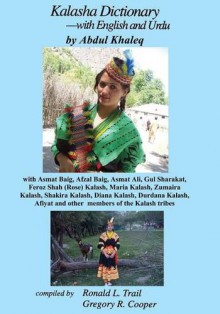The Kalash are known in Chitral as the “Black Kafirs” because they are not Muslims and their women wear black robes. There are or were two kinds of Kafirs: Red and Black. The Red Kafirs were known because of their red or pale skin. The Black Kafirs are known because their women wear black robes....
show more
The Kalash are known in Chitral as the “Black Kafirs” because they are not Muslims and their women wear black robes. There are or were two kinds of Kafirs: Red and Black. The Red Kafirs were known because of their red or pale skin. The Black Kafirs are known because their women wear black robes. These people first became known to the outside world because of an 1888 story by Rudyard Kipling entitled “The Man Who Would Be King”. That story was made into a movie in 1975 staring Sean Connery who usually played James Bond. It is considered to be one of the greatest movies of all time. Kalasha is a language spoken by three thousand speakers in the three Kalash Valleys of Bumboret, Birir and Rumbur in Chitral, Pakistan. Kalasha is also spoken by an estimated eight hundred people in the nearby former Kalash Valleys of Urtsun and Jinjoret. Those people have been reported to all be converted to Islam, but they still speak Kalasha in their homes. There are also Kalasha speakers in the Chitral Villages of Suwir and Kalkatuk. There are also Kalasha speakers who have moved out of the Kalash Valleys and live in Lower Pakistan in places such as Peshawar and Karachi. There is no way to determine how many Kalasha speakers there are, but Gul Sharakat who is on the cover here has been conducting her own research by interviewing Kalasha speakers throughout Pakistan and estimates there are fifteen thousand Kalasha speakers altogether. It is known that Kalasha is an old language, definitely two thousand years old and probably four thousand years old. Georg Morgenstierne says in his books that Kalasha has been spoken “for thousands of years.” The first and probably still the only qualified professional linguist to study the Kalash Language was Georg Morgenstierne. Although there is a wide-spread belief that Chitralis are descended from the soldiers of Alexander the Great who passed through the area in 327 BC, nobody who has studied the subject seriously believes that. Rather, the prevailing view is that Kalasha, Khowar and Latin are descended from a common source, Proto-Indo-European, a language or family of languages that originated north of the Black and Caspian Seas around four thousand years ago and spread in all directions from there.
show less

